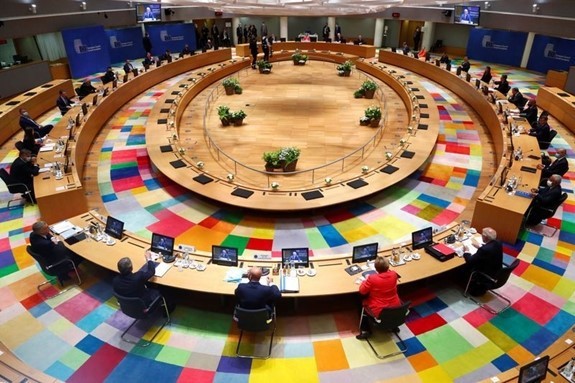(VOVWORLD) - European Union leaders agreed on a massive stimulus plan for their coronavirus-blighted economies at a fractious summit that lasted almost five days.
 The EU post-coronavirus recovery summit (Photo: AVI ) The EU post-coronavirus recovery summit (Photo: AVI ) |
The 750-billion-euro recovery fund will be used to boost the EU economy shattered by the COVID-19 pandemic, the worst economic crisis since World War II. The two biggest arguments were over the ratio of grants to loans and the distribution mechanism.
An important economic stimulus package
The EU economic recovery fund is a bailout for all members seriously affected by the COVID-19 pandemic. According to the EC’s Summer 2020 Economic Forecast released on July 7th, Italy’s annual GDP is set to shrink by 11.2%, Spain’s 10.9%, and France’s 10.6%. The Euro Zone’s GDP is forecast to shrink 8.7% this year.
Observers say that without the recovery fund leading corporations and businesses in some strategic sectors are at risk of being acquired. Brain drain may occur as skilled workers are lured away by foreign companies. French President Emmanuel Macron acknowledged prior to the summit that the negotiations hours would be crucial to the future of the EU.
Differences exposed
Under the initial proposal by the European Commission, Italy would be the biggest beneficiary of the fund with 81 billion euros in grants, while Spain would get 77 billion euros, France 39 billion, Poland 38 billion, and Greece 32 billion.
The proposal was strongly opposed by the the leaders of the Netherlands, Austria, Sweden, and Denmark, who advocated austerity measures. They said the recovery fund will benefit Italy and Spain, the two countries worst hit by the pandemic and who have looser management. Hungarian Prime Minister Viktor Orban criticized the Netherland’s Mark Rutt for attacking Hungary on the issue of the rule of law. Orban said Hungary agrees with Italy that the countries and territories worst hit by the COVID-19 pandemic must be helped as soon as possible. Italian Prime Minister Giuseppe Conte told the media that things are more complicated than one might think. The German Chancellor said the differences are huge. President of the European Council Charles Michel called on EU leaders not to expose the EU’s weaknesses.
Since March, the EU members agreed to close their borders to non-EU citizens and established green roads to transport goods and medical equipment within the bloc. Now to recover its economy, the EU has agreed on a stimulus package at a fractious summit.